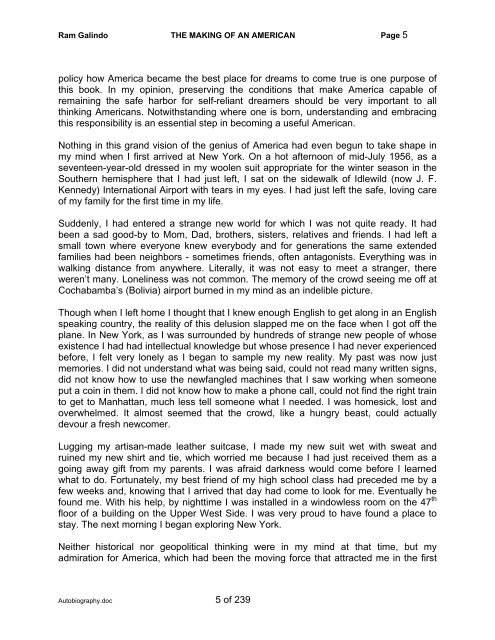Autobiography - The Galindo Group
Autobiography - The Galindo Group
Autobiography - The Galindo Group
You also want an ePaper? Increase the reach of your titles
YUMPU automatically turns print PDFs into web optimized ePapers that Google loves.
Ram <strong>Galindo</strong> THE MAKING OF AN AMERICAN Page 5<br />
policy how America became the best place for dreams to come true is one purpose of<br />
this book. In my opinion, preserving the conditions that make America capable of<br />
remaining the safe harbor for self-reliant dreamers should be very important to all<br />
thinking Americans. Notwithstanding where one is born, understanding and embracing<br />
this responsibility is an essential step in becoming a useful American.<br />
Nothing in this grand vision of the genius of America had even begun to take shape in<br />
my mind when I first arrived at New York. On a hot afternoon of mid-July 1956, as a<br />
seventeen-year-old dressed in my woolen suit appropriate for the winter season in the<br />
Southern hemisphere that I had just left, I sat on the sidewalk of Idlewild (now J. F.<br />
Kennedy) International Airport with tears in my eyes. I had just left the safe, loving care<br />
of my family for the first time in my life.<br />
Suddenly, I had entered a strange new world for which I was not quite ready. It had<br />
been a sad good-by to Mom, Dad, brothers, sisters, relatives and friends. I had left a<br />
small town where everyone knew everybody and for generations the same extended<br />
families had been neighbors - sometimes friends, often antagonists. Everything was in<br />
walking distance from anywhere. Literally, it was not easy to meet a stranger, there<br />
weren’t many. Loneliness was not common. <strong>The</strong> memory of the crowd seeing me off at<br />
Cochabamba’s (Bolivia) airport burned in my mind as an indelible picture.<br />
Though when I left home I thought that I knew enough English to get along in an English<br />
speaking country, the reality of this delusion slapped me on the face when I got off the<br />
plane. In New York, as I was surrounded by hundreds of strange new people of whose<br />
existence I had had intellectual knowledge but whose presence I had never experienced<br />
before, I felt very lonely as I began to sample my new reality. My past was now just<br />
memories. I did not understand what was being said, could not read many written signs,<br />
did not know how to use the newfangled machines that I saw working when someone<br />
put a coin in them. I did not know how to make a phone call, could not find the right train<br />
to get to Manhattan, much less tell someone what I needed. I was homesick, lost and<br />
overwhelmed. It almost seemed that the crowd, like a hungry beast, could actually<br />
devour a fresh newcomer.<br />
Lugging my artisan-made leather suitcase, I made my new suit wet with sweat and<br />
ruined my new shirt and tie, which worried me because I had just received them as a<br />
going away gift from my parents. I was afraid darkness would come before I learned<br />
what to do. Fortunately, my best friend of my high school class had preceded me by a<br />
few weeks and, knowing that I arrived that day had come to look for me. Eventually he<br />
found me. With his help, by nighttime I was installed in a windowless room on the 47 th<br />
floor of a building on the Upper West Side. I was very proud to have found a place to<br />
stay. <strong>The</strong> next morning I began exploring New York.<br />
Neither historical nor geopolitical thinking were in my mind at that time, but my<br />
admiration for America, which had been the moving force that attracted me in the first<br />
<strong>Autobiography</strong>.doc 5 of 239


